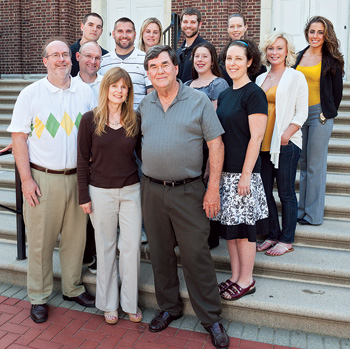Caring pays off for probationers, students

ALUMNI | The boy who was on probation for a theft charge when they first met a year ago had just enrolled in his first college course.
"His mother called us later that day and told us how he walked back to her car with tears in his eyes," Craig Fromme, AS75, remembers. "For some workers, that's an unusual story. We get them all the time."
There's no bravado in his voice—just 30-plus years of life as a juvenile probation officer, working alongside his wife, Susan, AS76, to ensure that court orders get carried out, sentence recommendations made and troubled youngsters counseled in the process.
The Double Dels have been to funerals. But they've been to far more graduations.
There was the young man who spent his entire 17th year in mental health facilities before the Frommes took him to the county learning center. Within two months, he earned the second-highest GED score in Delaware history. And the freshman football player with a D average and petty criminal record. After probation, he never missed an honor roll and attended college on a joint athletic-academic scholarship.
The success stories go on. Craig and Susan call it "positive persistence," caring about their young offenders, providing them with positive, realistic alternatives and never giving up.
Tapping his fist on the office desk to create a resounding boom boom boom, Craig gives his clients—kids with criminal records, not yet old enough to vote—a piece of advice: "This," he tells them, "is an opportunity knocking."
Standing before a packed lecture hall on the UD campus, he offers the same advice to his would-be interns. Since 1996, Craig and Susan Fromme have given hundreds of University students a "free look" into the world of juvenile probation, and more than 40 of them have gone on to work in Delaware state offices.
For the 15 or so undergraduates who intern with the two each year, it's a fast-paced transition from the academic world of books and theory to the real-world application of criminal justice in teens just a few years younger than themselves.
The students spend their first few weeks observing Craig and Sue, accompanying them on home visits and court hearings, slowly taking on a greater role as their knowledge and comfort levels increase. Their work benefits the probationers, of course, but the interns say that they gain far more from this experience than they give.
Craig and Sue show the informal aspects of the job. For instance: How do you go into a school and ask to speak to a student? Where do you go? Whom do you ask?
"I learned more from them than a classroom or orientation could have ever taught me," says Hailey Cockerham, AS11, who now works as a family service specialist.
Indeed, the Frommes do everything to ensure their interns enjoy success, from practicing mock interviews to introducing the young college students to judges after court hearings. "This is an internship that leads to a career," Craig says.
Aaron Fichtelberg, associate professor of criminal justice and the internship program director, calls the Frommes "incredible mentors, both to their clients and to our interns."
If the internship is a job-training, résumé-building opportunity for students, the Frommes see it as a way to repay their alma mater.
"We've put something together right here in Newark, not as CEOs or company presidents," Craig says. "We're just workers. But through this, we've been able to give back."
Article by Artika Rangan Casini, AS05





